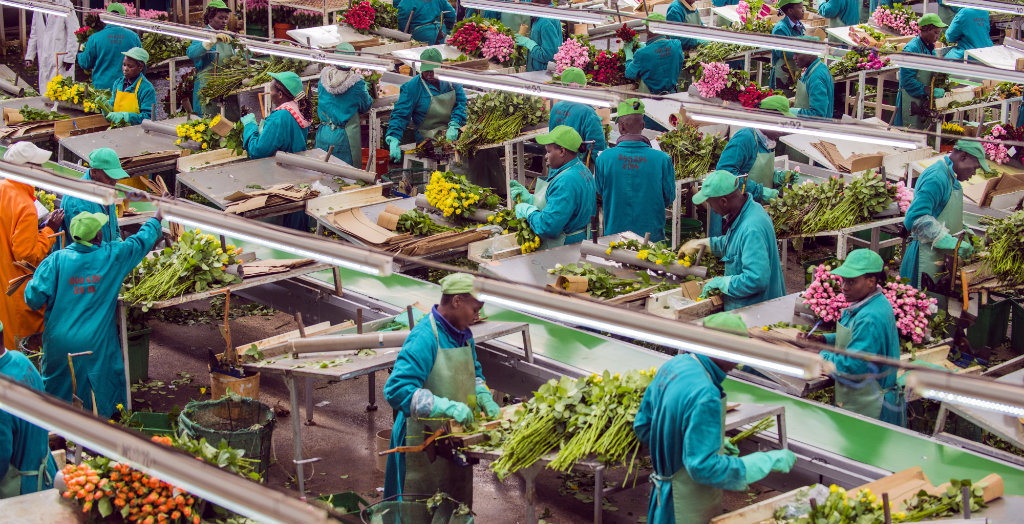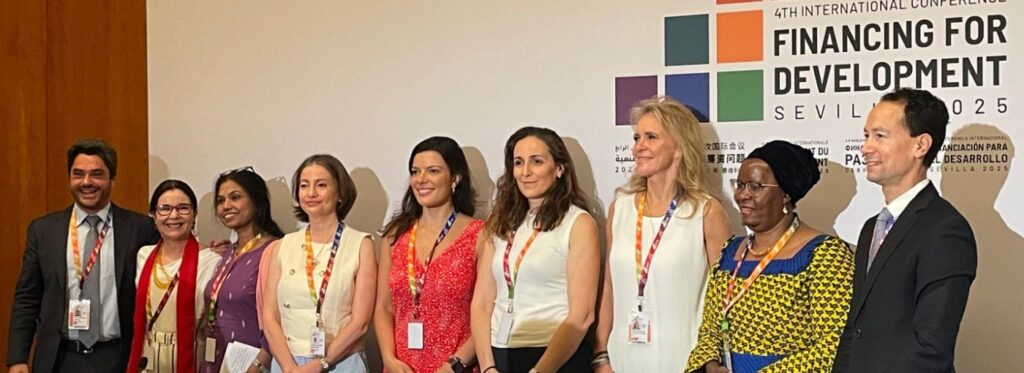Through the Women @ Work programme, Hivos and our local partners work together to improve the labour conditions for women working at international farms in Sub-Saharan Africa. Within this programme, we pay special attention to preventing gender-based violence and HIV and AIDS at the workplace as a means to increase women’s socioeconomic empowerment and wellbeing in general.
Lack of decent work policies and wages for women workers
In 2011, Hivos started the Women @ Work programme to contribute to decent work for women who earn their living by working for, amongst others, the international flower sector where basic labour rights are often violated. Many of these women who pick and process flowers earn very low wages and are not able to meet basic needs for themselves and their families. As most of them work on short-term contracts, they usually cannot go on sick or maternity leave, they lack adequate training to do their jobs safely, and sometimes they do not have access to proper equipment, which exposes them to dangerous chemicals and pesticides. In addition, sexual harassment is a long-standing structural problem both on and off the farms. Those in charge of such farms, who are most often heterosexual men, can abuse their power and privileged positions at work to assault their female employees without consequences.
HIV and AIDS remain major challenges in and out of the workplace
HIV and AIDS remain major challenges to socioeconomic development in Sub-Saharan Africa. The workplace in particular can present and reinforce different vulnerable factors that affect people living with HIV and AIDS. For example, one’s HIV and AIDS status can lead to open discrimination and stigmatisation by colleagues. Furthermore, the general lack of access to adequate healthcare limits HIV treatment and testing, while inadequate workplace policies do not address the sexual health of the employees (including the prevention of sexually transmitted infections, such as HIV). And the absence of procedures to report sexual harassment and/or abuse in the workplace limits its prevention and sanctioning. These factors not only have a strong influence on conditions on the farms, but also affect the surrounding communities where women workers live by reinforcing negative attitudes and behaviours around HIV and AIDS.
Fair working conditions as opportunities for social change
Adequate working conditions and workplace policies can present a unique opportunity to not only promote human rights and gender equality at the workplace, but also serve as effective tools to fight stigma and prevent the advance of the HIV/AIDS epidemic. They can have a positive impact on the lives of persons living with HIV and AIDS and decrease the risks of those who are already exposed to infection. Also, happier and healthier workforces improve business performance and add up to increased and more sustainable economic development. When people living with HIV, and women in particular, are able to actively participate in the labour market and are treated with dignity as employees, their productivity and the quality of their work will significantly improve. Therefore, investing in these women by paying them fair salaries and protecting their rights will contribute to their individual prosperity and benefit society at large.
The ‘Blooming Workplaces and Communities Project’
By combining the Women @ Work programme with our expertise in HIV & Human Rights programming, Hivos – in partnership with the Wagagai Farm and National Organization of Peer Educators (NOPE) – has set up “The Blooming Workplaces and Communities Project” in Uganda. This pilot project will explore new ways to address many of the complex and cross-cutting issues that also affect the lives of many women workers in other parts of Sub-Saharan Africa.
Filberts Oluoch, programme coordinator and Uganda team leader of NOPE, visited the Hivos Global Office to explain how Blooming Workplaces and Communities came into being. According to him, there are two main problems. The first is that flower farms deliberately hire women because of the widespread belief that women are gentler than men and will therefore treat the flowers with more care, reducing damage and loss. As a consequence, women remain largely flower pickers and processors and are rarely promoted to positions of greater responsibility. The second problem is that many CSOs continue to focus on awareness raising when speaking of HIV and AIDS. “People are aware, but they need to act. We need to move beyond awareness and look into the responsibilities that various actors can have,” explains Filberts.
Blooming Workplaces and Communities will address the stigmatising and discriminatory attitudes and practices faced by women living with HIV and AIDS, both in their workplace and at home. By engaging all relevant stakeholders involved, Hivos and its partners aim to change behaviours and perceptions in relation to gender equality, sex, sexual and reproductive health rights, HIV and AIDS, and violence against women.
The lessons learned from Blooming Workplaces and Communities will feed into Women @ Work’s broader development of women-friendly workplace policies. The human rights of people living with HIV in general, and young women in particular, will be protected better by supporting HIV prevention efforts and fighting stigma and discrimination in and out of the workplace. Only then will workplaces, communities and the women workers truly be able to bloom.






